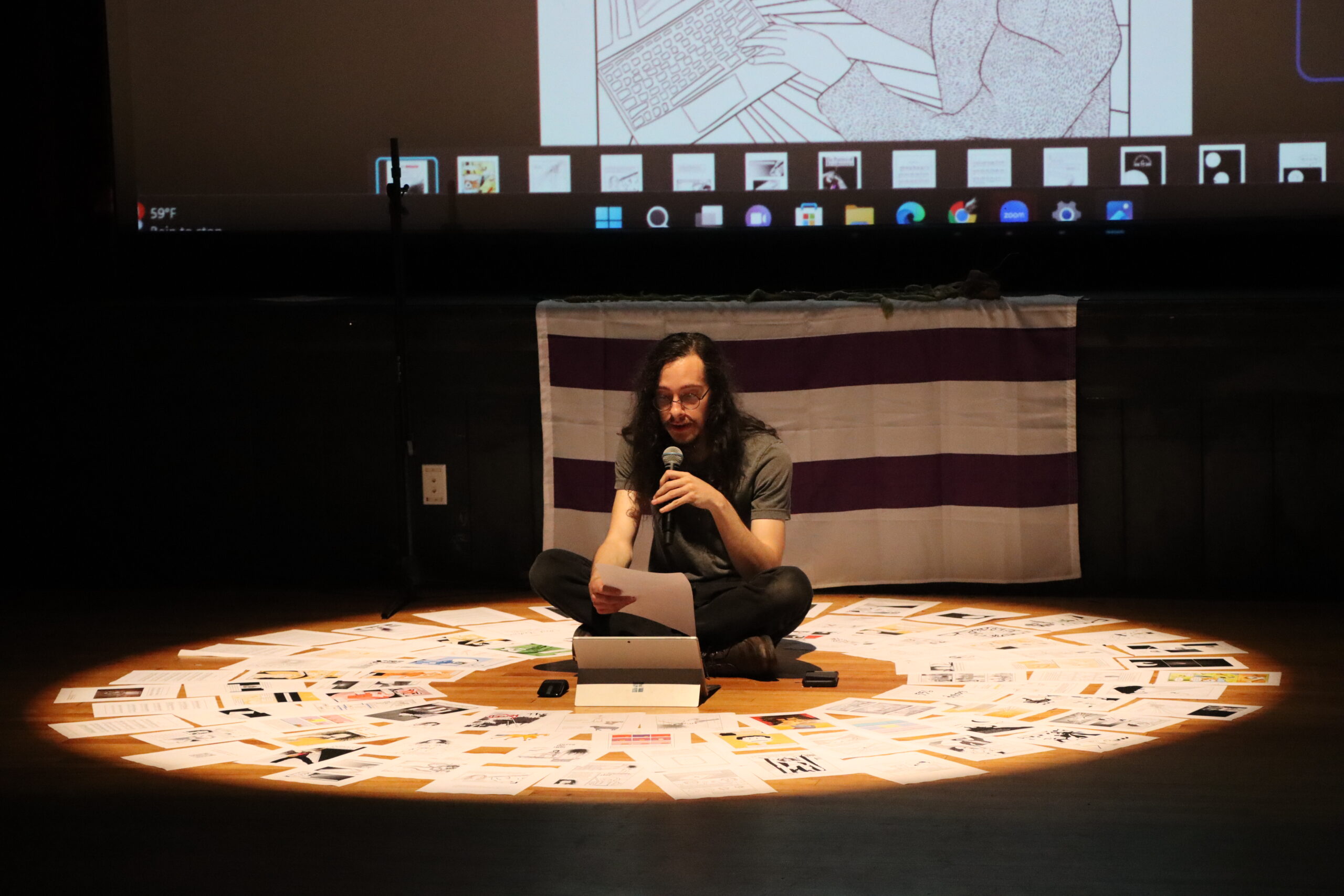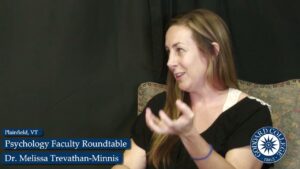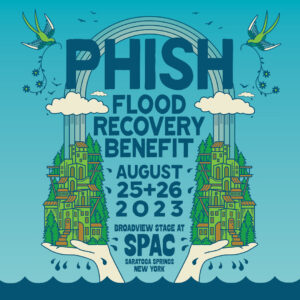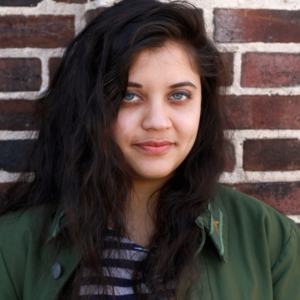Tim Simmons (Individualized MA ’18) Commencement Address, Goddard Graduate Institute Goddard College February 17, 1019
I have to admit, part of my reason for being here today is a little selfish. I am so excited to be back here at Goddard with all of you – some of my very favorite people in the world. I want to talk today about experience – specifically embodied experience – and that’s because my experiences with you have changed me in many ways, from listening to you speak so passionately about your studies, to talking with you over spirited dinner conversations, and I am so grateful and honored to be here. But, today, I want to explore why it is that our experiences change us so much, and in doing so, I hope to honor the ways in which you have come to embody the knowing, being, and doing that is so central to your scholarship, and to honor the wonderful work you all have done.

Satoshi Kitamura wrote a story that I loved to read to my children when they were little called Igor: The Bird Who Couldn’t Sing. Igor is a young bird who can’t wait for the first day of spring, when he can join the dawn chorus and sing his song. But when the moment arrives, the music he makes is so dissonant and unique that the other birds fall out of the tree laughing. Igor wants to make the other birds happy with his music, so he takes music lessons from Madame Goose, all to no avail. Soon, even Madam Goose gives up on Igor’s caterwauling. Finally, completely distraught and hopeless, he leaves home, but everywhere he goes, Igor encounters music, and he always feels an insatiable desire to sing along. And yet, just like back in his tree, his music is always rejected. Finally, completely alone, he finds a home on a rock in a desert. And then, one morning, watching a sunrise that is so beautiful that, as the book says, he feels as if he is about to cry, Igor becomes so overwhelmed with the sight, and the feelings it engenders inside him that he simply must sing. And just then, as he sings, the rock that holds his nest comes to life. Why, it’s the last Dodo bird! He tells Igor that his song was so beautiful that it woke him after years and years of sleep. Dodo takes out his balalaika (that’s my favorite part!), and joins Igor in his unconventional music. Together they jam for the rest of the morning, until the sun is high in the sky. Finally, they decide to form a band and tour the world!

I came to Goddard because I’ve always been a little like Igor. I felt a song deep inside me that was unique. Somehow, I felt that who I was, what I wanted to learn, and how I wanted to apply that learning in the world could not be served properly through traditional educational models. I even began a master’s degree somewhere else, and by the end of my own version of music lessons with Madame Goose, I became overwhelmed with a feeling of emptiness. I remember coming to the realization that I would never even want to read any of my own papers! That was it. I just couldn’t do it anymore. I wanted to sing my own Igor song, in my own way, and I knew, I knew, deep in my soul that my song had power and meaning, and that the only thing I needed was my own embodied experience to guide me. So I set off on my own.
This setting off on our own is what we celebrate today. You have followed your own bodies in your learning, and in some cases, laid the very cobblestones, on by one, of your pathway as you walked it! As a result, the work that you have done may guide others on their paths, inspire them, and definitely help them in countless ways.
But, before we celebrate and honor your work, I want to take just a moment to talk about the power and beauty of embodied experience. In The Body Has a Mind of Its Own, Sandra and Matthew Blakeslee explore body mandalas – their term used to describe the maps our brain constructs to help our body navigate the world. They argue, essentially, that consciousness is meaningless without embodied experience. They tell us, “Your body is not just a vehicle for your brain to cruise around in. The relationship is perfectly reciprocal: your body and your brain exist for each other… meaning is rooted in agency, and agency depends on embodiment.”

At the moment we are born, our brain begins mapping the world based on what our body experiences. In this way, everything we learn is, ultimately, the result of sensory input, and our brain’s ability to follow a map it has created based on what you experienced before. One way this occurs is through Mirror Neuron Systems, a neurologic mechanism that is designed for imitation. Stick your tongue out at a baby, and it will stick its tongue out too. From our very earliest moments in the world, we are aping everything around us. Molnar-Szakacs and Overy describe Mirror Neuron Systems as a way for an “individual to understand the meaning and intention of a communicative signal by evoking a representation of that signal in the perceiver’s own brain.”
This is a huge idea. I like to think of it in terms of the drumming that I do every day with my students. My research question while studying at Goddard was, can drumming make you a better reader? Well, thanks to Mirror Neuron Systems, it can. Picture this. I have two drum sets in my classroom, and I will often sit behind one and invite a student to sit at the other. Using a simple pattern, I will begin banging away, slowly, repetitively, and methodically. It always works. The student will watch me, and soon, their body begins to move, their right foot begins tapping the kick pedal, and their hands begin making the groove with me.
This is because we can imitate almost anything, and the Blakeslees explain that, as my student watches me, and hears the sounds my drum is making, their brain is firing away – the parts that signal muscular movement in the hands and feet for tapping out a rhythm, the parts that process the periodic pattern that creates the groove- they are all firing away before the student ever actually makes a move. Their brain is copying what my brain is doing based on the embodied experience they are having, and then it activates their body into similar motion. In many ways, my actions are re-wiring their brain.
As Krauss shows us, training in one area, such as music in my case, can influence other areas, such as reading. For example, the neural processing of periodic patterns in drumming is the same neurological aptitude that allows us to hear a stream of sounds coming from someone’s mouth and to divide them into discreet words, phrases, and sentences, and make meaning out of them. And then, when we see symbols on the page, we retrieve previously experienced sensory versions of those symbols and “read” them. So, practicing the drums can actually help re-wire the brain to better perceive rhythms, both in music and in language because of Mirror Neuron Systems.
Imitation is kind of a simple idea, and yet also kind of miraculous. Because, what this suggests to me today, as I stand here in front of you is that the very idea of who we are – our identity, our selves, our “me-ness” – what makes us wake up in the morning is the amalgamation of our embodied experience in the world – interacting with others, loving each other, arguing, dancing, singing. Our “me-ness” is the result of our experience of “you-ness”. The Blakeslees urge us to stay away from what they call the “Homunculus Fallacy” – the idea that there is a central, singular kernel of consciousness at the heart that drives our consciousness. In fact, consciousness is built out of thousands of maps we create based on the way our body moves through the world.
Simply put, we need each other.
Without each other, learning is completely meaningless. But, simply doing what someone else tells you to do is not enough, we need to imitate, improvise, and experiment. Parker Palmer tells us, “knowing is a profoundly communal act. Nothing could possibly be known by the solitary self, since the self is inherently communal in nature. In order to know something, we depend on the consensus of the community in which we are rooted – a consensus so deep that we often draw upon it unconsciously.”
And there it is.
The communal self that Palmer speaks of is this construction of Mirror Neurons and Body Maps that we use to navigate our world. Everything we are, everything we know, is based on our embodied experiences with each other. And when we approach our education without the rules and arbitrary hoops often found in more traditional models, we create what Palmer refers to as a hospitable space, and that is not easy! Palmer says: “Discomfort and pain are often signs that truth is struggling to be born among us … Hospitality means receiving each other, our struggles, our newborn ideas with openness and care. It means creating an ethos in which … the pain of truth’s transformations can be borne.”
He goes on, “A learning space needs to be hospitable not to make learning painless but to make the painful things possible. Things without which no learning can occur – things like exposing ignorance, testing tentative hypotheses, challenging false or partial information, and mutual criticism of thought.” This requires that we lose control – control founded in our preconceived notions of truth, so that we can move through the world completely open to what our body tells us. Again I return to Palmer, who tells us to lose control over the truth, so that the truth can control us.
And so we return to our little friend Igor, who suffered so much for his music. Who traveled the world, but who, as long as he was alone, could not sing. Until finally, one day, when the beauty was so overwhelming, he could avoid the truth of his music no longer, and he just had to sing. It was only then, when the painful thing became possible, that another person truly heard him.
I honor you for suffering, for making space in your life for the painful things, for listening to your world and for responding to it in your own way. For imitating, for experimenting, for improvising, for dancing and singing, and for building, here in front of us, a truly hospitable space where the truth can be borne out in embodied experience. Our experience of each other is where we find the truth, not alone. For, honestly, none of us can really know anything, and yet, something inside us just must sing. Ultimately, we don’t really know anything other than what our body tells us, and so it’s our responsibility to speak the truth as we know it, or as we embody it.

In Pilgrim at Tinker Creek, Annie Dillard tells us, “We don’t know what’s going on here. If these tremendous events are random combinations of matter run amok, the yield of millions of monkeys at millions of typewriters, then what is it in us, hammered out of those same typewriters, that they ignite? We don’t know. Our life is a faint tracing on the surface of mystery, like the idle, curved tunnels of leaf miners on the face of a leaf. We must somehow take a wider view, look at the whole landscape, really see it, and describe what’s going here. Then we can at least wail the right question into the swaddling band of darkness, or, if it comes to that, choir the proper praise.”
By engaging in your studies, you have created a community of truth, a hospitable space where painful things have been made possible, and have led to learning and growth. You have made tiny steps towards truth, towards making meaning out of your world, and your embodied experience will be a mirror for the rest of us, so that we can transcend our moment, so that we can learn from you, so that we can see the sunrise too, and jam along with you until the sun hits the highest point in the sky.
So here we are, we’re all sitting in the sunlight holding our balalaikas, and we’re ready to sing. Thank you for being beautiful and courageous, honest and critical. Thank you for wailing your questions into the darkness, and for singing your praise.
Read Tim’s moving speech here: Tim Simmons Goddard Graduation Talk.







